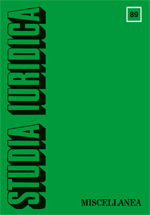Przekład artykułu Sibyl A. Schwarzenbach „Braterstwo, solidarność i przyjaźń obywatelska”
A translation of Sybil A. Schwarzenbach’s “Fraternity, solidarity, and civic friendship”
Author(s): Kamila Szyszka, Dorota SepczyńskaSubject(s): Law, Constitution, Jurisprudence
Published by: Wydawnictwa Uniwersytetu Warszawskiego
Keywords: fraternity; solidarity; justice; civic friendship; ethical reproductive praxis; Rawls; Marx; Aristotle; braterstwo; solidarność; sprawiedliwość; przyjaźń obywatelska; etyczno-reprodukcyjna praxis
Summary/Abstract: Justice requires a certain form of “fraternity” (Rawls), “solidarity” (Marxists) or “civic friendship” (Aristotle), which is often justified with a need to limit socio-economic inequalities that can undermine just political institutions. However, fraternity has long been associated with the community of “male citizens”, and was also usurped by a totalitarian margin (e.g. the Bruderschaftof the Nazi elite). Less often it is observed that the idea of solidarity, of “standing together” in the opposition to practices of exploitation, has also been modelled on historically male forms of activity: on marching, demonstrating, fighting at the barricades (military activity) or launching labour strikes (economic production). The significance of the notion of civic friendship today is grounded in a third model – that of ethical action or praxis – i.e. in all those activities that support the reproduction of flourishing relations (here called friendship), whether personal or civic, for their own sake. This model of activity has been eclipsed in the modern period by the dominant model of production, yet it includes a host of practices, traditionally (but by no means exclusively) performed by women outside the market: feeding and caring for the young, for the old and sick, developing others’ abilities, educating them, simple playing, etc. Once this alternative model is developed – and its practices thoroughly adapted to modern principles of universal right and respect for personhood – the ideal of civic friendship may just be the most appropriate idea of community for today’s democratic and pluralist society.
Journal: Studia Iuridica
- Issue Year: 2021
- Issue No: 89
- Page Range: 345-369
- Page Count: 25
- Language: Polish

